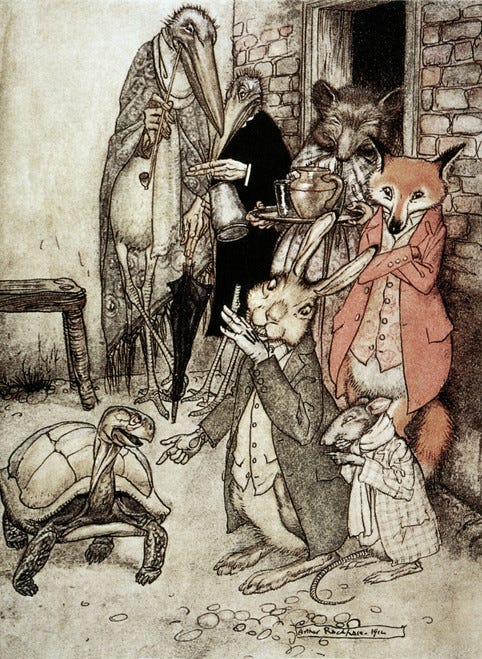Community Comments - Aesop's Fables
Turns out, you guys know a lot more about this stuff than me.
We had a good week this week, and we kicked it all off with a discussion of Aesop’s Fables, and I admitted the rather embarrassing fact that I thought Aesop was alive in the 1800s (they’re from Ancient Greece, by the way).
Turns out, no one else was quite as off about the date as I was, although there were a few people who were surprised by just how old they were.
, for example, thought they were from the Dark Ages or Middle Ages.The Middle Ages was the most popular ‘wrong answer.’
thought the same thing.Also, check out Frater on YouTube! It’s an absolute treasure. He has a ton of amazing music on there.
Also, since we were talking about fables, his are witty and thought-provoking and an absolute blast (here’s one that I liked as a teaser):
Anyway, he writes fables, so if he didn’t know that Aesop was Greek, then at least I’m in good company.
knew, but at least he was a good sport about it.I also wasn’t the only one to talk about animals this week! As
and pointed out, also wrote a fantastic piece about animal stories this week, which you can read here:It begs the question: why do people feel compelled to tell stories using animals?
Well, there’s a few reasons, and the first might be simply self-preservation.
noted that Aesop might’ve come under fire for speaking out against tyrants if he used humans instead of animals.We talked about different endings quite a bit, actually.
I talked about two endings to “The Ant and the Grasshopper”—one in which the ants take pity on the grasshopper, and the other in which the grasshopper freezes/starves.
Writing the post, I assumed that the former ending was a modern invention, and mocked it accordingly.
noted some potential agendas that could’ve had a hand in its creation.I’m with you, Stone—let ‘em freeze. Teach kids the truth.
asserted something similar:I think he’s right that the ending could be older than I’d originally thought.
After all, as
points out, there’s a good chance that Aesop’s fables weren’t meant for children at all. also didn’t seem to be a fan of the ‘protect the children hypothesis’ (as I’m now terming it).Endings aside,
also noted that some of Aesop’s fables made their way nearly verbatim into the Bible, and must’ve gotten the memo, because she shared the article with this quote from Proverbs:It’s remarkable. These stories have endured for millenia. They’ve survived through oral tradition and written records. They’ve made their way into religious texts.
As
points out, times change.And as
says here, the traits that our socieities emphasize in our stories really showcase the things we value the most.Society has undergone many transformations since Ancient Greece. The fact that these stories have endured really speaks to the existence of something universal. These fables seem to speak to our distinctness and our oneness all at the same time.
It’s remarkable. Thank you all for being a part of this discussion. This was just one of the many great ones we had on Thinking Man this week. We talked about physics and Steven Pressfield (twice). There were great discussions on all of them, but unfortunately, we’ll be here all night if I examine them all, so I decided to stick to one this week.
As always, thank you all for reading and for joining the discussion. It is a joy to hear what you all have to say about the topics we choose to talk about. We are grateful for every single one of you, whether you were mentioned here today or not.
Thank you for reading. If you enjoy these posts and would like to support our work, consider becoming a free or paid subscriber.














Smart bunch of people here on Substack.
Thank you for including me in such a wide ranging discussion of topic so seemingly simple.